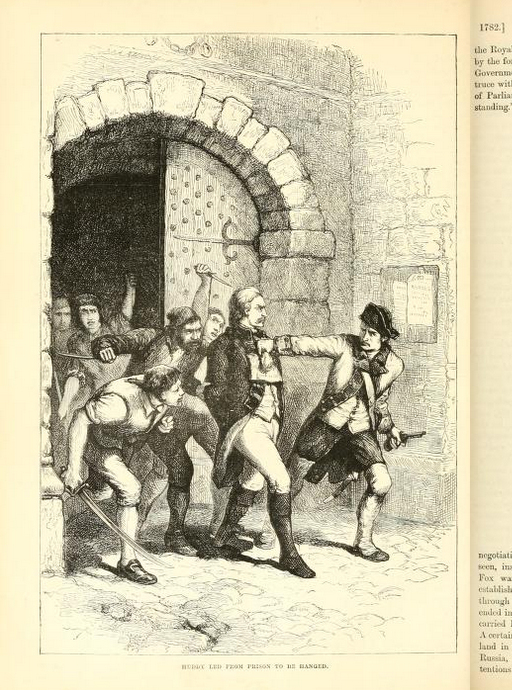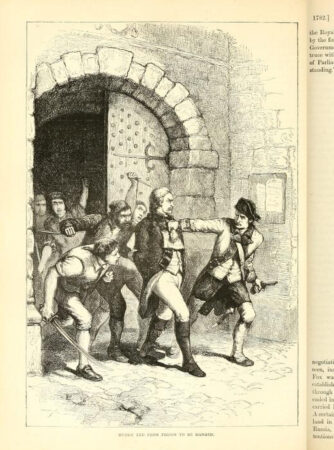On April 12, 1782, about six months after the British commander Lord Cornwallis surrendered at Yorktown, effectively ending the Revolutionary War, Patriot militia Captain Joshua Huddy was removed from the infamous British Liberty Street Sugar House prison in New York City by Monmouth County Loyalists who were living as refugees on Sandy Hook. They were under the direction of Richard Lippincott, who was among the many Loyalists driven from their homes in Monmouth County for their opposition to the revolution. Huddy was taken to Highlands and hanged from a tree. His executioners left a note on his breast, “Up Goes Huddy for Phillip White,” in reference to a Tory who had recently been killed while in Patriot custody. It was reported that Huddy died calmly and bravely, and even shook hands with Lippincott (the illustration above is an artist’s imagination of the event…there is no known image of Joshua Huddy). Huddy’s body was brought to Freehold, and he was buried in an unmarked grave at Old Tennent Church.

Cold-blooded and premeditated, the Loyalist hanging of Joshua Huddy provoked revulsion in high places. George Washington called it an “instance of Barbarity,” while British General Sir Henry Clinton viewed it as an “audacious… breach of humanity.” Yet in one respect, Huddy’s executioners were peculiarly civilized – they allowed their victim to dictate his last will and testament just moments before his death. His will included the following: “Expecting shortly to depart this life,” an expectation no doubt influenced by the noose around his neck. Huddy bequeathed equal shares of his scant wealth to his two daughters, and none to his second wife. According to some accounts, he signed his will on the head of the very barrel “from which he was to make his exit.”
Source:
Saretzky, Gary D. (2004). The Joshua Huddy Era: Documents of the American Revolution. Catalog of the Exhibition at Monmouth County Library Headquarters, Manalapan, N.J. October 2004; Revised November 2004. Produced by the Monmouth County Archives. Available: https://www.monmouthcountyclerk.com/archives/events-exhibits/2004-documents-of-the-american-revolution-joshua-huddy-era/
Joshua Huddy led from prison to be hanged, 1782 (c1880). A print from Cassell’s History of the United States, by Edmund Ollier, Volume II, Cassell Petter and Galpin, London, page 450. Public Domain. Available: https://archive.org/details/cassellshistoryous02olli/page/450/mode/2up


Leave a Reply